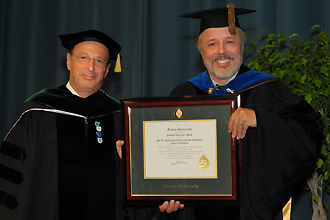Deininger Invested as Oncology Chair
The Tulane University School of Medicine invested Prescott Deininger as the first holder of the Joe W. and Dorothy Dorsett Brown Foundation Chair in Oncology. The chair was established through a $1.2 million gift from the Joe W. and Dorothy Dorsett Brown Foundation and with matching funds from the Louisiana Board of Regents.

A happy Prescott Deininger, right, celebrates his investiture as the first holder of the Brown Foundation Chair in Oncology, along with Dr. Ben Sachs, left, dean of the School of Medicine. (Photo by Tracie Morris Schaefer)
The late Joe W. Brown and Dorothy Dorsett Brown acquired valuable real estate and oil properties in Louisiana throughout the 1920s after they moved to New Orleans from Texas. Many of the Browns' charitable gifts were anonymous with the notable exception of the popular recreation center at Joe W. Brown Park in New Orleans. The foundation in their name was established in 1958 to improve communities in Louisiana and Mississippi.
“Dr. Deininger spearheads the life-improving work the Browns treasured throughout their lives,” said university provost Michael Bernstein, who presided over a ceremony on Tuesday (May 17).
Deininger joined the Tulane faculty in 1998 after distinguishing himself at the Medical Research Council in Cambridge, England, where he worked with Frederick Sanger, two-time Nobel Prize winner and inventor of DNA sequencing.
In his research, Deininger developed and patented the first design of dominant negative mutants, which are useful in understanding genetically inherited diseases that can lead to deafness, vision loss and muscle degeneration. He directs the Tulane Cancer Center and serves as co-director of the Louisiana Cancer Research Consortium.
Dr. Ben Sachs, dean of the medical school, praised Deininger's role in the creation of the cancer consortium. “Both Tulane and the city of New Orleans owe him an enormous thanks,” said Sachs.
Brown Foundation president D. Paul Spencer said he is thrilled such a distinguished scholar now holds the oncology chair. “We continue to be a friend of Tulane, and we expect to continue supporting the university for years to come,” Spencer said.
Though highly regarded for his research expertise, Deininger said his greatest triumphs reside in his role as mentor. “Seeing your students successful is one of the most gratifying things.”
Michael Ramos is a development writer in the Tulane Office of Development Research and Writing.
